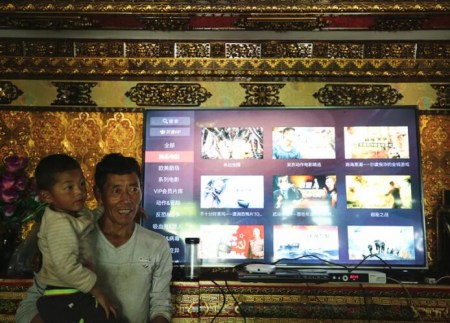
Ciren Gesang, a resident in Zhaxi Tuomen community of Shannan Prefecture, China's Tibet Autonomous Region, stands in front of the internet television with his son in his hands. (Photo/China.org.cn)
"In the past, if we wanted to announce something to our residents in our community, we had to spend lots of money on telephone bills, or we even sometimes had to use a loudspeaker - but the wind always carried the sound away. If we spoke towards the west, the residents in the east missed it, and if we spoke faced to the east, those in the west would hear nothing," said Dunzhu, head of Zhaxi Tuomen community in Shannan Prefecture, China's Tibet Autonomous Region, in his introduction to online alternatives for daily interactions.
Since last year, Dunzhu began to use WeChat groups to make announcements to the 502 residents in the community's 135 households. In a few months, different WeChat groups had been set up for different types of residents to offer targeted and timely services. Now, there are groups for low-income family members, students, coach drivers, migrant workers, community leaders and daily talks, as well as groups for learning various skills or information.
Ciren Gesang is one of the 24 members of the group for low-income families. The 50-year-old man with a four-year-old son found his job as a forest ranger in the group. "There are often some job postings in this WeChat group, and the job I found here earns me 3,000 yuan every year. I can also enjoy the subsidy for low-income families," he said with a smile on his face.
In addition to job-hunting, Ciren Gesang also enjoys chatting online with his brother who works as a migrant worker in Lhasa, but could rarely make video calls due to the high costs. However, things are different with Wi-Fi covering 87 households in the community, including Ciren Gesang's. "With Wi-Fi, it is cheaper now to chat online," Ciren Gesang said. Now, he can make video calls to his brother now and again.
"Every household only needs to pay 330 yuan per year, or 0.9 yuan per day to enjoy 20M/s Wi-Fi, a free fixed-line telephone, and a mobile Set Top Box (STB) for watching internet television free of charge," Dunzhu introduced.
"All this would be impossible without the support of the [Naidong] government, because otherwise, the Wi-Fi service would cost 560 yuan and the mobile STB would cost 240 yuan per year, and there would be no way for us to enjoy the free fixed-line telephone and the free internet television with a TV channel in Tibetan language."
The investment has allowed 87 households to enjoy Wi-Fi so far, and 18 more households will be added to the list later this year. Even the basketball field and tea house have been covered, and the tea house even supports paying the bills by WeChat.
For villagers in this community, the internet has provided other conveniences. "When a photo of an ID card was required, I could send a photo through WeChat without having to go to the village committee," Ciren Gesang recalled.
Dunzhu also gave an example of the convenience brought by the Wi-Fi coverage. "With the internet, our community can hold video conferences. In the past, conferences held by the government were reluctant to include the community because it can be very difficult to gather everyone in the conference room, but now, we can hold a video conference to convey the gist of the conference."
The successful practice of WeChat groups in assisting people's lives and promoting their wellbeing has prompted Dunzhu to go further. In March 2017, he took the initiative to set up a public platform on WeChat under the guidance of the Naidong government to offer timely service to the residents in the community.
Through the platform, Dunzhu shares resources related to agricultural production, preferential policies, advanced technologies, husbandry expertise, among many others. At any time or any place, residents can browse through the public platform to acquire useful information, improve themselves, and enjoy the benefits brought by the internet.


















































